条件状语从句知识点总结
- 格式:doc
- 大小:11.23 KB
- 文档页数:3

条件状语从句其它引导词总结有关条件状语从句其它引导词总结有关条件状语从句其它引导词总结一、我们都知道,在英语条件状语从句中,引导条件状语从句最常用的连词是if,由if引导的条件状语从句表示在某种条件下某事很可能发生。
例如:1. If you ask him,he will help you.如果你请他帮忙,他会帮你的。
2. If you fail in the exam,you will let him down.如果你考试不及格,你会让他失望的3. If it rains,we will stop playing.如果下雨,我们就不玩了。
二、那么,除了if和unless之外,是否还有其他连词也可以引导条件状语从句呢?回答是肯定的,不仅有,还有很多。
这些词由于出现的频率较小,且用法较复杂一些,所以不如if和unless为大家所熟知罢了。
下面就这些词的用法以例句的形式进行一下简单总结。
1、so/as long as只要,例句:1)You may borrow my book as long as you keep it clean.只要你保持书的清洁,你就可以把我的书借去。
2)So long as you’re happy, it doesn’t matter what you do.只要你高兴,你做什么都没有关系。
2、on condition(that)...在……条件下,如果on condition (that)...引导的条件从句是主句事件发生的前提条件或唯一条件。
1)I can tell you the truth on condition that you promise to keep a secret.我可以告诉你真相,条件是你答应保密。
2)You can go swimming on condition (that) you don't go too far from the river bank.你只有在不远离河岸的条件下才可以下水游泳。

条件状语从句的四种类型解析条件状语从句是英语语法中常见的一种从句类型,用于表示一个条件或假设。
它可以通过四种不同的方式来表达,在文章中起着重要的作用。
本文将对这四种类型进行详细解析。
第一种类型:真实条件状语从句真实条件状语从句用来表示一个可能发生的条件和其结果。
它的结构是“if + 陈述句,陈述句”。
该类型的状语从句使用的是一种常见、普遍的条件句结构。
例如:If it rains, we will stay at home.(如果下雨,我们会呆在家里。
)If I have time, I will go to the library.(如果我有时间,我会去图书馆。
)这种类型的状语从句所表达的条件通常是可能实现的,所以它与现实情况相符。
第二种类型:虚拟条件状语从句虚拟条件状语从句用来表示一个假设性的条件和其结果。
它的结构是“if + 过去式,would/could/might + 动词原形”。
该类型的状语从句常用于表达不太可能实现的条件。
例如:If I were rich, I would travel around the world.(如果我富有,我会周游世界。
)If he had studied harder, he could have passed the exam.(如果他努力学习,他本可以通过考试。
)在这种类型的状语从句中,主句通常包含一个虚拟语气的动词,表示对现实情况的一种想象或假设。
第三种类型:反过来的条件状语从句反过来的条件状语从句用来表示一个反向的条件和其结果。
它的结构是“had/should + 陈述句,would/could/might + 动词原形”。
该类型的状语从句常用于反向的条件假设。
例如:Had it not been for your help, I would have failed.(如果不是你的帮助,我就会失败。
)Should you need any assistance, feel free to contact me.(如果你需要任何帮助,随时联系我。

引导条件状语从句的连接词主要有:if(如果)、unless(除非)或as long as(只要)等。
unless在意思上等于if...not。
一、条件状语从句用法1、引导条件状语从句最常用的连词是if,由if引导的条件状语从句表示在某种条件下某事很可能发生。
如:If you ask him, he will help you.如果你请他帮忙,他会帮你的。
If you fail in the exam, you will let him down.如果你考试不及格,你会让他失望的。
另外,if从句还表示不可实现的条件或根本不可能存在的条件,也就是一种虚拟的条件或假设,从句多用一般过去时或过去完成时。
如: If I were you, I would invite him to the party.如果我是你,我会邀请他参加聚会。
2、unless = if...not.除非,若不,除非在……的时候例如:Let's go out for a walk unless you are too tired.=If you are not too tired, let's go out for a walk.Unless it rains, the game will be played.除非下雨,比赛将照常进行。
3、so/as long as只要例句;Y ou may borrow my book as long as you keep it clean. 只要你保持书的清洁,你就可以把我的书借去。
So long as you’re happy, it doesn’t matter what you do. 只要你高兴,你做什么都没有关系。
二、时态问题在条件状语从句中,要注意“主将从现”的规定,即主句用一般将来时,从句用一般现在时表示将来时。
例句:I will come to see you if I have time. 我有时间,我就来看你。

状语从句的用法归纳总结及用法状语从句是复合句中的一种主从结构,用于修饰、说明主句中的动词、形容词、副词等成分。
它起到补充、限制和修饰主句的作用,使得整个句子更加准确丰富。
在英语写作中,灵活运用状语从句能够提高表达的准确性和语言的流畅度。
本文将对状语从句进行归纳总结,并详细介绍其常见的使用方式。
一、时间状语从句时间状语从句是指修饰主句谓语动词发生时间或时间段的从句。
以下是几种常见的时间状语从句:1. 当/当…时(When)这是表示某个事件或行为发生时机的常见引导词,如:- When I was a child, I used to play in the park.- I will give you a call when I arrive at the airport.2. 每当…就(Whenever)这种类型的时间状语从句指动作在不同时刻重复出现,如:- Whenever it rains, my dog hides under the bed.- The children always get excited whenever they see ice cream.3. 只要…就(As long as)这类状语从句表达的是条件和结果,如:- You can borrow my car as long as you promise to return it before midnight.- As long as you work hard, you will succeed.4. 一…就(Once)这种类型的状语从句表示的是某件事情发生的时候立刻做出反应,如:- Once you finish your homework, you can go out and play.- Once the sun sets, darkness falls quickly.二、地点状语从句地点状语从句修饰主句中动词的地点或方向。
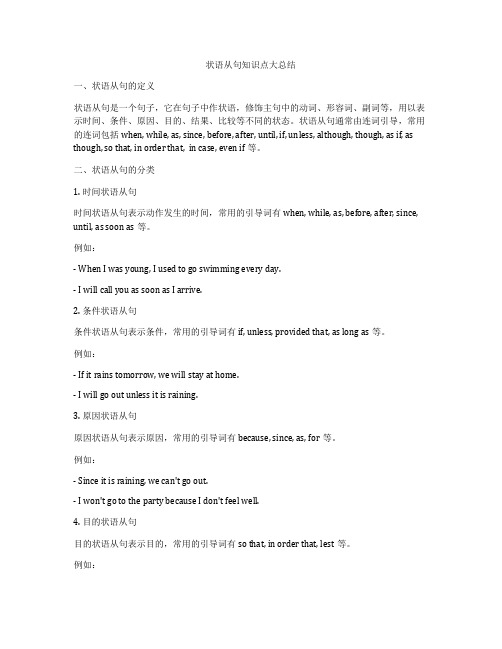
状语从句知识点大总结一、状语从句的定义状语从句是一个句子,它在句子中作状语,修饰主句中的动词、形容词、副词等,用以表示时间、条件、原因、目的、结果、比较等不同的状态。
状语从句通常由连词引导,常用的连词包括when, while, as, since, before, after, until, if, unless, although, though, as if, as though, so that, in order that, in case, even if等。
二、状语从句的分类1. 时间状语从句时间状语从句表示动作发生的时间,常用的引导词有when, while, as, before, after, since, until, as soon as等。
例如:- When I was young, I used to go swimming every day.- I will call you as soon as I arrive.2. 条件状语从句条件状语从句表示条件,常用的引导词有if, unless, provided that, as long as等。
例如:- If it rains tomorrow, we will stay at home.- I will go out unless it is raining.3. 原因状语从句原因状语从句表示原因,常用的引导词有because, since, as, for等。
例如:- Since it is raining, we can't go out.- I won't go to the party because I don't feel well.4. 目的状语从句目的状语从句表示目的,常用的引导词有so that, in order that, lest等。
例如:- I study hard so that I can get a good job.- We left early in order that we might avoid the traffic.5. 结果状语从句结果状语从句表示结果,常用的引导词有so...that, such...that等。

条件状语从句的用法总结条件状语从句就是在复合句中表示主句动作发生条件的状语从句。
引导条件状语从句最经常用的连词是if,它的意思是“如果”;除此之外,还有unless (=if…not如果不……,除非), as/so long as(只要), while(=as long as只要), supposing (that)/provided /providing (that)(假如), in case(假使), on condition that(在……的条件下)等。
它们也多少含有“如果”的意思,也可用于引导条件状语从句。
1. 用if引导:if意为“如果”。
如:You can’t take photographs if the light is bad. 光线不足,就无法拍照。
If you cheat in the exam you’ll never get away with it. 考试作弊必予追究。
2. 用unless引导:unless的意思是“如果不”“除非”。
如:Don’t act unless you’re certain. 没有把握就不要做。
Unless you go at once you will be late. 如果你不马上走,就会迟到的。
3. 用as [so] long as引导:as [so] long as的意思是“如果”“只要”。
如:I’ll remember that day as long as I live. 只要我活着,我就不会忘记那个日子。
You may take my dictionary as long as you don’t keep it too long. 只要使用时间不太长,你可以把我的词典拿去。
4. 用in case引导:in case用连词引导条件状语从句时,其意为“如果”“万一”。
如:In case I’m late, start without me. 万一我迟到,就不等我了。

初中英语知识点归纳条件状语从句的引导词和用法条件状语从句是英语语法中的一种特殊句型,用来表示某个条件成立时会发生的情况。
在条件状语从句中,引导词起到引导从句的作用。
本文将对初中英语知识点中的条件状语从句的引导词和用法进行归纳。
一、if引导的条件状语从句1. 当主句是一般现在时时,条件状语从句可以是一般现在时或should + 动词原形。
例如:- If he comes early, we will go to the movies together.- If it rains tomorrow, we should stay at home.2. 当主句是一般过去时时,条件状语从句要用过去时态。
例如:- If I had money, I would buy a new car.- If he studied hard, he could pass the exam.3. 当主句是一般将来时时,条件状语从句可以使用一般现在时或一般过去时。
例如:- If you go shopping, I will wait for you here.- If I had time, I would help you with your homework.二、unless引导的条件状语从句1. Unless 在句中的含义与if相反,表示“除非”,引导的条件状语从句与if引导的条件状语从句的用法相同。
例如:- I won't go to the party unless you invite me.- Unless you practice more, you won't improve your English.三、as long as引导的条件状语从句1. As long as 表示“只要”,引导的条件状语从句要使用一般现在时。
例如:- You can join us as long as you finish your homework.- As long as you work hard, you will succeed.四、in case引导的条件状语从句1. In case 表示“以防”,引导的条件状语从句使用一般现在时。

if引导的条件状语从句总结(精)if引导的四种条件状语从句一、零条件句/绝对真实条件句(Zero Conditional)零条件句,又叫绝对真实条件句,用于阐述事实。
用来表达在该条件下,结果一定会如此(如规则,客观规律、真理等)。
结构是:If+主语+do/does,主语+do/does。
其从句和主句的谓语动词通常为一般现在时。
二、第一条件句/相对真实条件句(First Conditional)第一条件句又叫相对真实条件句,谈论将来可能发生的事情,并考虑这件事情的结果。
强调偶然性或一次性的条件,也可以与绝对真实条件句同义。
if从句用一般现在时或其他现在时,表示将来可能发生的事情(条件);主句用一般将来时,表示这件事情的结果。
结构是:If+主语+do/does,主语+will do。
三、第二条件句/现在虚拟条件句(Second Conditional)第二条件句是虚拟条件句的一种,即现在虚拟条件句(Unreal Present),用来表达在现在或将来时间下不太可能或不可能发生的条件,这种条件句还可以用来表示试探性的、委婉的语气(可以理解为不大有自信,所以不太真实的条件)。
结构是:①与将来事实相反的非真实条件句是If+主语+should do/were to do/did,主语+would/should/could/might do;②与现在事实相反的非真实条件句是If+主语+did,主语+would/should/could/might+do。
四、第三条件句/过去虚拟条件句(Third Conditional) 第三条件句是表示与过去事实相反的虚拟语气,是用来表达如果(If)当时那样发生,另外一方面(当时)结果会如何。
通常是指过去的事情,带有一切已经太迟而不能够补救的意思。
结构是:If+主语+had done,主语+would/should/could/ might+have done。
if 条件句的时态搭配1.if从句用一般现在时,主句用一般将来时2.if从句用一般现在时,主句用may/might/canIf the fog gets thicker the plane may/might be diverted.3.if从句用一般现在时,主句用must/shouldIf you want to lose weight you must/should eat less bread.4.if从句用一般现在时,主句用一般现在时5.if从句用现在进行时,主句用一般将来时6.if从句用现在完成时,主句用一般将来时If you have finished dinner I’ll ask the waiter for the bill.。
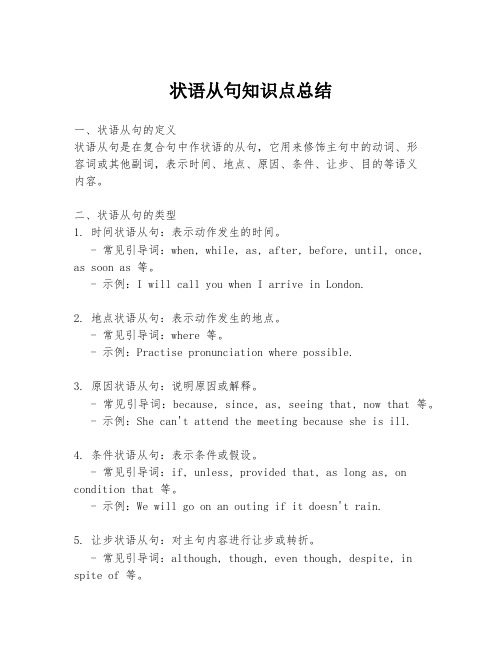
状语从句知识点总结一、状语从句的定义状语从句是在复合句中作状语的从句,它用来修饰主句中的动词、形容词或其他副词,表示时间、地点、原因、条件、让步、目的等语义内容。
二、状语从句的类型1. 时间状语从句:表示动作发生的时间。
- 常见引导词:when, while, as, after, before, until, once, as soon as 等。
- 示例:I will call you when I arrive in London.2. 地点状语从句:表示动作发生的地点。
- 常见引导词:where 等。
- 示例:Practise pronunciation where possible.3. 原因状语从句:说明原因或解释。
- 常见引导词:because, since, as, seeing that, now that 等。
- 示例:She can't attend the meeting because she is ill.4. 条件状语从句:表示条件或假设。
- 常见引导词:if, unless, provided that, as long as, on condition that 等。
- 示例:We will go on an outing if it doesn't rain.5. 让步状语从句:对主句内容进行让步或转折。
- 常见引导词:although, though, even though, despite, in spite of 等。
- 示例:Despite the bad weather, we went for a walk.6. 目的状语从句:表示目的。
- 常见引导词:so that, in order that 等。
- 示例:He gets up early so that he can catch the first bus.7. 结果状语从句:表示结果。
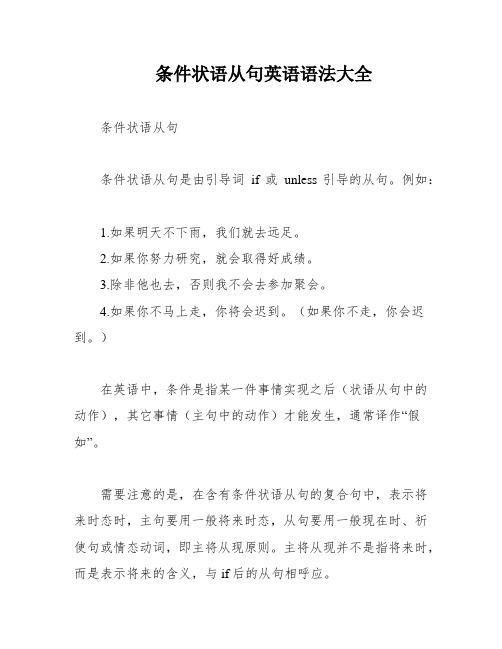
条件状语从句英语语法大全条件状语从句条件状语从句是由引导词if或unless引导的从句。
例如:1.如果明天不下雨,我们就去远足。
2.如果你努力研究,就会取得好成绩。
3.除非他也去,否则我不会去参加聚会。
4.如果你不马上走,你将会迟到。
(如果你不走,你会迟到。
)在英语中,条件是指某一件事情实现之后(状语从句中的动作),其它事情(主句中的动作)才能发生,通常译作“假如”。
需要注意的是,在含有条件状语从句的复合句中,表示将来时态时,主句要用一般将来时态,从句要用一般现在时、祈使句或情态动词,即主将从现原则。
主将从现并不是指将来时,而是表示将来的含义,与if后的从句相呼应。
条件状语从句类型if是条件状语从句最常用的连词,表示在某种条件下某事很可能发生。
例如:1.如果你请他帮忙,他会帮你的。
2.如果你考试不及格,你会让他失望。
if引导的条件状语从句既可以将从句放前面,也可以将从句放后面。
例如:“如果天下雨,我们就不玩了”可以转化为“We will。
playing if it rains.”此外,if从句还可以表示不可实现的条件或根本不存在的条件,即一种虚拟的条件或假设,从句多用一般过去时或过去完成时。
例如:表示可能实现的条件,主句用一般将来时,从句用一般现在时。
例如:If it rains tomorrow。
we will stay at home。
如果明天下雨,我们会待在家里。
非真实条件句则表示假设的情况,分为虚拟条件句和虚拟结果句。
虚拟条件句表示与现实相反的情况,主句用would/could/might+动词原形,从句用过去时或过去完成时。
例如:If I had more time。
I would travel around the world。
如果我有更多时间,我会周游世界。
虚拟结果句则表示与现实相反的结果,主句用过去时,从句用would/could/might+动词原形。
例如:If I had studied harder。

状语从句的用法归纳总结状语从句是指在主句中作状语的从句,用于修饰主句的动作或状态,包括时间、地点、原因、条件、方式、结果等方面。
以下是状语从句的用法归纳总结:1. 时间状语从句:用于表示主句所描述的动作或状态发生的时间,常见的引导词有when,while,as,before,after,until等。
例如:When I went to Paris, I visited the Louvre Museum.As I was walking to the store, I met my old friend.2. 地点状语从句:用于表示主句所描述的动作或状态发生的地点,常见的引导词有where,wherever等。
例如:Where there is a will, there is a way.You can go wherever you want.3. 原因状语从句:用于表示主句所描述的动作或状态的原因,常见的引导词有because,since,as,now that等。
例如:Because it was raining, I stayed home.Since I have time, I will help you.4. 条件状语从句:用于表示主句所描述的动作或状态的条件,常见的引导词有if,unless,provided that,as long as等。
例如:If you work hard, you will succeed.Unless you hurry, we will miss the bus.5. 方式状语从句:用于表示主句所描述的动作或状态的方式,常见的引导词有as,as if,as though等。
例如:He plays guitar as if he were a professional.I will do it as you told me.6. 结果状语从句:用于表示主句所描述的动作或状态的结果,常见的引导词有so that,such that等。

条件状语从句的引导词及句型转换条件状语从句是英语中常用的一种从句结构,用来表示条件、原因、目的等。
在条件状语从句中,引导词起着引导句子结构的作用,而句型转换则可以使表达更加灵活多样。
本文将介绍条件状语从句的常见引导词及句型转换方法。
一、条件状语从句的引导词常见的条件状语从句引导词有:if, whether, unless, provided (that), as long as等。
1. IfIf是条件状语从句的最常见引导词,表示“如果”,可用来引导真实条件状语从句与虚拟条件状语从句。
例如:- If it rains tomorrow, we will stay at home.- If I were you, I would take the job.2. WhetherWhether是用来引导陈述句的间接疑问句,表示“是否”。
例如:- I don't know whether he will come to the party or not.3. UnlessUnless表示“除非”,相当于if...not,引导否定条件状语从句。
例如:- You will fail the exam unless you study hard.4. Provided (that)Provided (that)表示“只要”,相当于as long as。
例如:- You can go out to play provided (that) you finish your homework.二、条件状语从句的句型转换条件状语从句可以通过句型转换来增加语言表达的多样性。
1. 将条件状语从句改为条件状语从句的省略句当主句与条件从句的主语和谓语相同时,可以将从句中的主语和be 动词省略。
例如:- If you come late, you will miss the train.变为:Come late, you will miss the train.2. 将条件状语从句改为条件状语从句的倒装句当主句与条件从句中的某些状语或状语修饰语倒装时,可以将条件从句改为倒装句。

状语从句知识点总结高考状语从句是一个句子,用来修饰主句谓语动词的状语成分。
它使用了连接词(或连接副词),并在主句中充当状语。
状语从句可以表示时间、原因、目的、条件、方式、比较、让步等不同的情况。
1. 引导词状语从句的引导词有很多种,其中最常见的有:(1)时间状语从句:when, while, as, before, after, since, until等。
(2)地点状语从句:where, wherever等。
(3)原因状语从句:because, since, as, for等。
(4)条件状语从句:if, unless, provided that等。
(5)目的状语从句:so that, in order that等。
(6)方式状语从句:as, as if, as though等。
(7)比较状语从句:than, as, as…as等。
(8)让步状语从句:though, although, even if等。
(9)结果状语从句:so…that, such…that等。
2. 位置状语从句一般放在主句前面,但也可以放在主句后面。
当状语从句放在主句前面时,一般用逗号隔开。
例如:Before you leave, please turn off the lights.而当状语从句放在主句后面时,不需要逗号隔开。
例如:He turned off the lights before he left.3. 时态状语从句的时态一般和主句的时态有一定的关系。
在条件状语从句中,通常使用现在时代替将来时,过去时代替过去将来时。
在时间状语从句中,通常使用过去时替代主句中的现在时,过去完成时替代主句中的过去时。
在目的状语从句中,通常使用should/ would/ could/ might+动词原形。
在让步状语从句中,通常使用虚拟语气。
在结果状语从句中,通常使用so…that, such…that引导。
4. 语序状语从句中,如果主句的谓语动词是及物动词,那么连接词的选用也是有一定限制的。
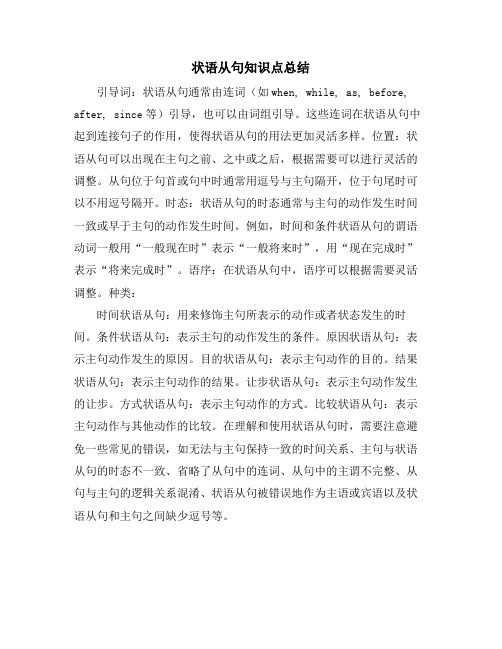
状语从句知识点总结
引导词:状语从句通常由连词(如when, while, as, before, after, since等)引导,也可以由词组引导。
这些连词在状语从句中起到连接句子的作用,使得状语从句的用法更加灵活多样。
位置:状语从句可以出现在主句之前、之中或之后,根据需要可以进行灵活的调整。
从句位于句首或句中时通常用逗号与主句隔开,位于句尾时可以不用逗号隔开。
时态:状语从句的时态通常与主句的动作发生时间一致或早于主句的动作发生时间。
例如,时间和条件状语从句的谓语动词一般用“一般现在时”表示“一般将来时”,用“现在完成时”表示“将来完成时”。
语序:在状语从句中,语序可以根据需要灵活调整。
种类:
时间状语从句:用来修饰主句所表示的动作或者状态发生的时间。
条件状语从句:表示主句的动作发生的条件。
原因状语从句:表示主句动作发生的原因。
目的状语从句:表示主句动作的目的。
结果状语从句:表示主句动作的结果。
让步状语从句:表示主句动作发生的让步。
方式状语从句:表示主句动作的方式。
比较状语从句:表示主句动作与其他动作的比较。
在理解和使用状语从句时,需要注意避免一些常见的错误,如无法与主句保持一致的时间关系、主句与状语从句的时态不一致、省略了从句中的连词、从句中的主谓不完整、从句与主句的逻辑关系混淆、状语从句被错误地作为主语或宾语以及状语从句和主句之间缺少逗号等。
总之,状语从句的使用可以丰富句子的结构,使文章更加丰富多样。
掌握状语从句的引导词、位置、时态、语序以及种类等知识点,对于提高英语写作能力具有重要意义。

条件状语从句用法条件状语从句在英语中十分常见,它指的是一个句子中表示条件的从句。
通常情况下,条件状语从句用于将某件事或行动与前提或特定情况联系起来。
以下是条件状语从句的用法和举例。
1. 如果(if)句型这个最基本的条件句提供了某种条件,它通常被用于表示假设或可能性。
例如:- If you don’t eat your vegetables, you won't grow strong.(如果你不吃蔬菜,你不会变强壮。
)- If she studied hard, she would pass the exam.(如果她努力学习,她就会通过考试。
)2. 在条件语句中使用“unless”“unless”在条件从句中的作用与“if”相反。
也就是说,“unless”表示如果不发生某件事情,将会发生另一件事情。
- Unless you practice every day, you won't improve your skills.(除非你每天练习,否则你的技能不会有所提高。
)“in case”表示为防万一,也就是说,这个条件是为了解决可能发生的问题而设定的。
这种从句经常出现在描述做准备工作的情况下。
4. 在条件语句中使用“provided that”或“as long as”这两个条件语句都表示在满足一定条件下才能实现另一件事情。
其中,provided that 表达的意思有时候会更强烈一些。
这种方式很常见,它使用if从句作为条件,然后使用then从句来说明如果条件满足了会发生什么。
“even if”用来表示某种情况即使发生了时,仍保持一定的结果,通常用于表示考虑所有因素之后仍有一定的结论。
“if only”表示对当前情况的强烈期望,它通常用于表示情感的需求。
综上所述,条件状语从句是英语中一种非常常见的语言工具,它能为整个文本添加更多的细节和深度。
通过理解和学习它的使用方法,我们可以更好地运用这种从句,使自己的表达更加地丰富多彩。

中考英语复习考点《条件状语从句》一、考点详解:定义:条件状语从句,即在某种条件下,一件事情可能发生。
在英语中由连接词if或unless等引导的状语从句叫作条件状语从句。
条件是指某一件事情实现之后(状语从句中),一件事情(主句)才能发生,通常译作"假如,只要,如果"等意思。
条件状语从句中,主从句的时态要遵循"主将从现"的原则。
即,主句是将来时态时,从句用一般现在时代替将来时态。
引导条件状语从句的连词或词组有:if(如果),unless(除非),as long as(只要)等。
如果主句是将来时,条件状语从句也用一般现在时来表示。
如:I will stay at home if it rains tomorrow. 如果明天下雨,我就待在家。
You can’t learn English well unless you work hard.除非你努力学习,否则是学不好英语的。
1、if引导的条件状语从句表示在某种条件下某事很可能发生。
If we pay much attention to the earth, we’ll have a better world.如果我们多关爱地球,就会拥有一个更美好的世界If it rains tomorrow, what shall we do? 如果明天下雨,我们怎么办?If you ask him, he will help you. 如果你请他帮忙,他会帮你的。
If you fail in the exam, you will let him down.如果你考试不及格,你会让他失望的。
注意:if还可以引导虚拟条件句,表示不可实现的条件,从句中多用一般过去时或过去完成时。
What would happen if there were no water? 如果没有水会怎样?2、unless引导的条件状语从句unless的意思是"如果不,除非"。
可与if... not互换。
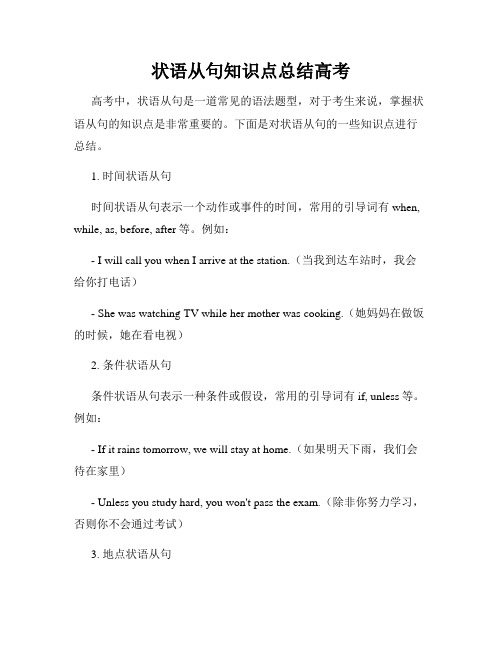
状语从句知识点总结高考高考中,状语从句是一道常见的语法题型,对于考生来说,掌握状语从句的知识点是非常重要的。
下面是对状语从句的一些知识点进行总结。
1. 时间状语从句时间状语从句表示一个动作或事件的时间,常用的引导词有when, while, as, before, after等。
例如:- I will call you when I arrive at the station.(当我到达车站时,我会给你打电话)- She was watching TV while her mother was cooking.(她妈妈在做饭的时候,她在看电视)2. 条件状语从句条件状语从句表示一种条件或假设,常用的引导词有if, unless等。
例如:- If it rains tomorrow, we will stay at home.(如果明天下雨,我们会待在家里)- Unless you study hard, you won't pass the exam.(除非你努力学习,否则你不会通过考试)3. 地点状语从句地点状语从句表示一个动作或事件的地点,常用的引导词有wherever, wherever等。
例如:- We can have a meeting wherever you like.(无论你喜欢在哪里开会,我们都可以)- She will go wherever her parents go.(她会去她父母去的任何地方)4. 原因状语从句原因状语从句表示一个动作或事件的原因,常用的引导词有because, as, since, for等。
例如:- He didn't come to the party because he was sick.(他没来参加派对是因为他生病了)- As it was getting late, I decided to leave.(因为时间已经很晚了,所以我决定离开)5. 方式状语从句方式状语从句表示一个动作或事件的方式,常用的引导词有as, like, as if等。

If 条件状语从句归纳总结一.. if意为“如果”,引导真实条件状语从句,可放在主句后,也可放在主句前,常用逗号隔开。
2. 含if引导的条件状语从句的复合句中,主句有下列情况时,从句用一般现在时表示将来意义。
①当主句为一般将来时态时。
如:If your daughter comes, I will call you up.②当主句是祈使句时。
如:Please stay at home if it rains tomorrow.③当主句的谓语含有can, may, must等情态动词时。
如:If he goes on smoking, it may be very bad for his health.④当主句的谓语是hope, wish, want等动词时。
如:I want to go there if the rain stops.练习:1. If he hard, he will get good grades.A. studyB. studiesC. will studyD. studied2. I want to know if Mary to the party tomorrow.A. goB. wentC. will goD. goes3. Everyone must dress up. If you , they won’t let you in.A. don’tB. won’tC. can’tD. mus tn’t4. Mary will go to Sanya if she a five-day trip.A. haveB. hadC. will haveD. has5. If he comes late, he will miss the train.A. andB. soC. /D. or适当形式填空:1. If she ______ ( run) every day , she will be much stronger .2. If you _____ ( be) late for school , your teacher _____ (be)angry .3. If Mary ______ (win)the prize , her parents will be proud of her .4. If Tom _____ ( not do ) it , his brother ______ (do) it .5. We _____ ( get) into trouble if the workers _______ ( not help ) us .6. Please _______ ( tell ) me if you _______(go).7. I _______ ( leave) for Beijing if it ________ ( not snow) this afternoon .8. If it _______(not rain)tomorrow , _____(let)us go shopping .9. If I get up late tomorrow , I _______ (be)late for school .10. Please bring your ID card . If you ______ (not bring) your ID card , you can’t go to the party .11. If he _____ (offer) to help me with my English , I’ll be very happy .12. Mother told me if I ______ ( do) something wrong I should say sorry to her .13. If it ______ (snow) tomorrow , we’ll build a snowman .14. If somebody _______ ( wait) for you , you may go now .15. If he ______ (go) to the party , I _______ ( go) , too .16. Could you tell me if my father ______ ( arrive) home on time ?17. If my father _____ ( have) time tomorrow , he’ll take me to the zoo .18. _____(visit) the place if you _____ ( are ) interested in it .19. If you have a cold , _____ ( drink) water as much as possible .20. If you _____ ( not be ) happy , _______ ( try) ______( listen) to your favorite music .()1.If you _____ to the party, you’ll have a great timeA. will goB. wentC. goD. going()2.–What are you going to do tomorrow? --We’ll go to the library tomorrow if it ___. A. isn’t rain B. rain C. won’t rain D. doesn’t rain()3. What will you do if you _____ to the old folk’s home visit?A. goB. wentC. goingD. will go()4. If I eat ____ food, I’ll be very fat.A. too manyB. many tooC. too muchD. much too()5. I’ll give the book to him if he ___ here next Sunday.A. will comeB. comesC. is comingD. came()6. I ____ her the answer if she ____me. A. can tell, will ask B. will tell, will ask C. would tell, ask D. will tell, asks7. We’ll go to the farm and help the farmers with the apple-picking if it ____ tomorrow. A. won’t rain B. will be rainy C. doesn’t rain D. isn’t raining【2011陕西】24. If there no buying and selling of animals, there no killing in nature. A. is; will he B. will be; will be C. is; is D. will be; is答案:A 【解析】考查点:本题考查if引导的状语从句的时态。
条件状语从句知识点总结
一、条件状语从句
条件状语从句是在主句和从句之间条件关系的从句,一般用来表示一定条件下事物发生的可能性,常用虚拟语气,表示与现实相反的假设。
1、以if, unless, supposing, providing, as long as, only if等引导的条件状语从句,它的谓语动词多用虚拟语气:(1)主句用一般现在时,从句谓语动词用“should/were to+
动词原形”的结构;
(2)主句用一般过去时,从句谓语动词用“should/would+动词原形”的结构;
(3)主句用“should/would+动词原形”,从句谓语动词用“should/would+动词原形”的结构,
例如:
If you should pass the exam, I would be very happy.
Unless she were to go there today, she would miss the bus.
2、以unless引导的条件句表“前提”,意思是“如果不……”,它后面的谓语动词多用虚拟语气,其句子结构有二种形式:(1)unless+主句谓语动词+从句谓语动词;
(2)Unless+主句谓语动词+从句谓语动词+be
例如:
Unless you work hard,you will fail the exams.
Unless she is careful,she will be in trouble.
3、以if…not引导的条件句,表示一定条件下发生的相反情况,它的谓语动词也用虚拟语气,句子结构由两种形式:
(1)if+主句谓语动词+not,从句谓语动词+be;
(2)If+主句谓语动词+not,从句谓语动词+动词原形
例如:
If he doesn't study hard, he won't pass the exam.
If you didn't come here on time, you'd miss the train.
4、以had better, would rather引导的条件句,它们表示一种建议,它的主句谓语动词必须用“should/would+动词原形”,从句谓语动词也有两种形式:
(1)从句谓语动词+be;
(2)从句谓语动词+动词原形。
例如:
You had better study hard or you wouldn't pass the exam.
I would rather you come early or you will miss the train.
二、重点总结
1、条件状语从句是在主句和从句之间条件关系的从句,用来表示一定条件下发生的可能性。
2、以if, unless, supposing, providing, as long as, only if等引导的条件状语从句,其它谓语动词一般多用虚拟语气,有三种形式:
(1) 主句用一般现在时,从句谓语动词用should/were to+动词原形;
(2) 主句用一般过去时,从句谓语动词用should/would+动词原形;
(3) 主句用should/would+动词原形,从句谓语动词用
should/would+动词原形。
3、以had better, would rather引导的条件句,其主句谓语动词必须用“should/would+动词原形”,从句谓语动词有两种形式:从句谓语动词+be;从句谓语动词+动词原形。